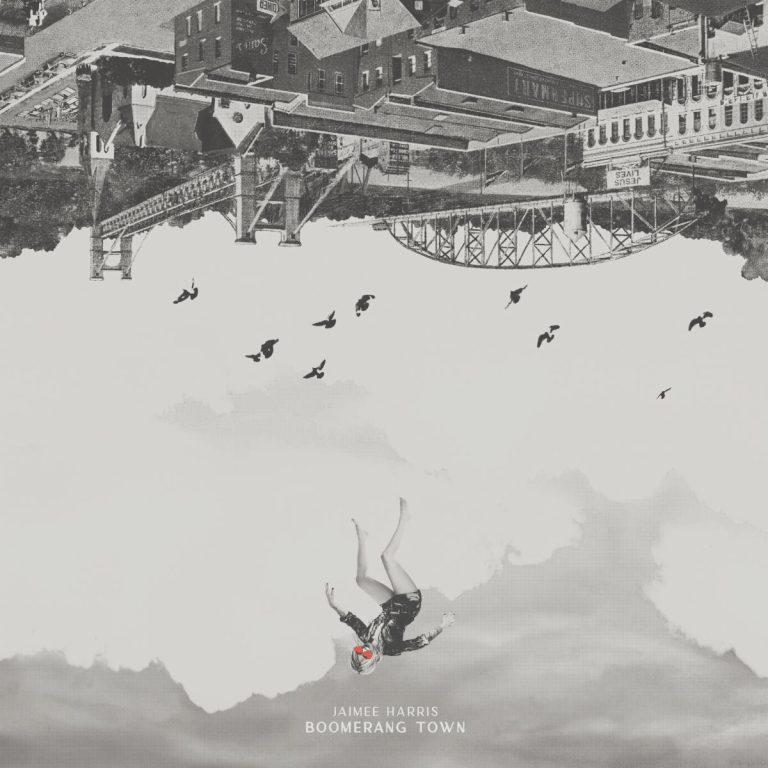The renegade who yearns to shrug off stifling family dynamics. The poet weary of dead-end jobs. The dreamer alternately propelled by grandiosity and crippled by self-loathing. The Lover aching for Big Love. These archetypes are part and parcel of rock and roll, the popular canons brimming with narratives that glorify freedom and the impulse to self-actualize. From chants to the blues to contemporary playlists, such declarations abound, pointing to the spirit’s perennial ache for release.
Building on her stellar 2018 debut, Red Rescue, Jaimee Harris releases her second LP, Boomerang Town, reveling in precisely crafted images and sensual melodies that conjure the tension between oversized ambition and cramped realities. The title song, for example, is a complexly woven epic about a couple fueled by mega dreams who keep spinning “in circles, round and round in this boomerang town.” As the track unfolds, the couple continue to find themselves in circumstances that fall shorter and shorter of their aspirations, the singer’s partner, Julie, descending into despair.
If “Boomerang Town” captures the existential plight of being stuck, “Sam’s” is equally unflinching, focused on the perils of isolation and mental illness. That said, Harris skillfully avoids over-the-top nihilism. Indeed, the characters in Harris’s narratives are far from one-dimensional victims. Though they suffer, often badly and perhaps excessively, their aches for more are the stuff of epics, conjuring Springsteen’s legacy as well as recent work by Gretchen Peters, The Killers, and Thomas Dollbaum, among others.
“The Fair and Dark-Haired Lad” addresses the intergenerational nature of addiction, personifying alcoholism. Harris keenly describes the syndrome of craving and regret, though she concludes with an image that points to the possibility of recovery: “Turn the engine over roll the windows down / left a note to tell ’em where I’m bound / I say goodbye tip my hat / to the fair and dark-haired lad.” Accents by Michele Gazich on violin and Dirk Powell on accordion infuse the piece with an eerie vibe.
On “Good Morning, My Love”, Harris navigates the relational doubts that often emerge late at night and/or early in the morning; “Did those demons all stay under / the bed in which you lay or did they cry out / tell you to change your mind about me?” Harris’s voice is plaintive yet engaged, trepidatious yet urgent. “Like You” similarly navigates a “coffee house” folk style and includes one of Boomerang Town’s stand-out lines: “Tonight the moon is colored like old smokers’ teeth”. “Fall (Devin’s Song)”, co-written with Mary Gauthier, centers on a person who died young; “Your friends are in the auditorium / you should be with them in your cap and gown”. Though Harris doesn’t reveal Devin’s cause of death, we can’t help but wonder if she is commenting on the opioid epidemic and the alarming number of people dying daily from overdoses.
While the bulk of Boomerang Town addresses loss and compromise, the set’s closing songs show Harris embracing an even-tempered tone and effusing a quiet confidence. With “Love Is Gonna Come Again”, Harris assures a friend (or perhaps herself) that what you most want often arrives “when you’re not quite looking.” Her voice segues effortlessly from lower to higher pitches. On “Missing Someone,” buoyed by a semi-funky guitar and layered percussion, Harris’s voice is notably sanguine. A wiry slide guitar courtesy of Andre Moran adds a campfire-ish cum roadhouse-y feel. While heartache is inevitable, Harris suggests, hope does in fact spring eternal.
With Boomerang Town, Harris laments, elegizes, and finds perspective, landing, by album’s end, in a more empowered state. Her voice never falters, equally seductive when mercurial as when equanimous, when grounded as when soaring. A worthy addition to the corpus of American Romanticism, Boomerang Town reminds us that life ultimately occurs on terra firma, even as our spirits reach for the sky.

